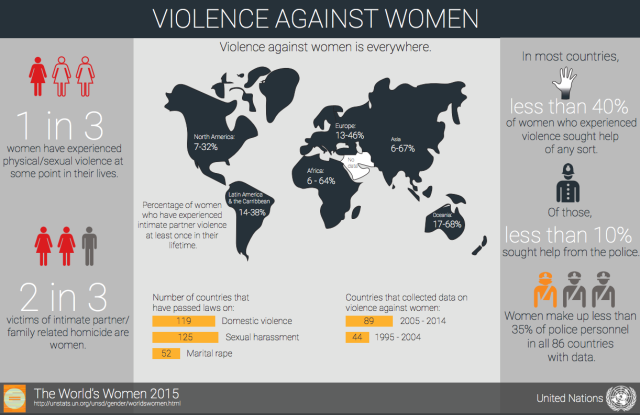By Nikita Rathod, Communications and Events Assistant, Institute of Global Health Innovation
Today marks the International Day for the Elimination of Violence against Women.
Historically, the date of the 25th of November was designated as an awareness day in December 1999 by the United Nations General Assembly through resolution 54/134. The aim of the day was to increase worldwide awareness and create opportunities for discussion about challenges and solutions.
Specifically, the 25th of November was selected as it was on this date that the three Mirabal sisters who were political activists in the Dominican Republican, were brutally assassinated. Creating awareness of violence against women on this date however goes as back as far as 1981 with the first Feminist Encuentro for Latin America and the Caribbean.
In 2016, the campaign for eliminating violence against women is well established and attracts global engagement. It has expanded vastly since it was established over 15 years ago. The day is accompanied by the 16 Days of Activism, which runs from the 25th of November until the 10th of December which marks Human Rights Day. The UN’s UNiTE to End Violence against Women Campaign also proclaim the 25th of every month as “Orange Day”. People across the globe will be wearing the colour orange for the cause. From being a day of awareness, the campaign has now manifested into monthly activities to help end injustices against women and girls.
Today, women’s rights and opportunities have come a long way. However it is important to remember the full extent to which violence against women continues to be prevalent. It’s a common misnomer that only women from developing countries experience violence. Findings from the UN show that all women can be subject to physical, sexual and psychological violence regardless of their income, education or where they live. Across the world, 35% of women have experienced physical and/or sexual violence by an intimate partner or non-partner at some point in their lives.
Despite the fact that women aren’t discriminated against by where they might be in the world, there are practices that are more common in certain regions. Wife-beating is generally high in Africa, Asian and Oceania, and UN research shows that 125 million girls in 29 countries in Africa and the Middle East had been subjected to female genital mutilation. The reasons for why violence continues to exist are intertwined in a complex set of factors. Culturally, violence is more acceptable towards women in some countries. Attitudes of women being subordinate to their male equivalents remain in some private and public spheres of societies. Above all, gender inequality is the leading cause of violence against women. Some of these factors can be tackled with education, using social norms and creating better services for women. There are a number of challenges associated with tackling these causes. For example, where better resources and support systems are created for women, there is an added issue that many women do not feel comfortable in reporting crimes to authorities.
The reasons for why violence continues to exist are intertwined in a complex set of factors. Culturally, violence is more acceptable towards women in some countries. Attitudes of women being subordinate to their male equivalents remain in some private and public spheres of societies. Above all, gender inequality is the leading cause of violence against women. Some of these factors can be tackled with education, using social norms and creating better services for women. There are a number of challenges associated with tackling these causes. For example, where better resources and support systems are created for women, there is an added issue that many women do not feel comfortable in reporting crimes to authorities.
Despite the difficulties, the UN has continued to work hard to make a stamp on eliminating violence against women. Solutions have included pushing countries to outlaw crimes through legislation. In 2011, the government in Cape Verde passed a new law against gender-based violence. The UN used their resources to train those in the legal field to help enforce the piece of legislation. In Haiti, UN Women also helped to train individuals in a safehouse so that counselling and medical services could be offered to victims. Educating girls to understand the root causes of violence has also become key, through programmes such as “Voices against Violence”
It’s clear that the addressing the violence that women are experiencing all around the world is an enormous task. This is all the more reason why having awareness day for the cause is crucial. Initiatives that exist are varied but progress may be slow as societal change is often gradual. Undoing generations of gender inequality is a huge challenge which means that today is paramount in alerting everyone to the continued violence that takes place daily. International Day for the Elimination of Violence Against Women every year is a very necessary reminder that women all across the world cannot go on living experiencing gender-based violence as ‘a norm’.
